Home » Posts tagged 'In English' (Page 2)
Tag Archives: In English
History of Classics Discussed at UHK
An essential part of the Oral History and the Classics project was a conference held in the Faculty of Philosophy, University of Hradec Králové. This academic meeting which took place on June 1st-2nd and was titled Classics: the Past, the Present, and the Future. It gathered specialists reflecting on various issues related to the development of classical studies including history of ancient philosophy.
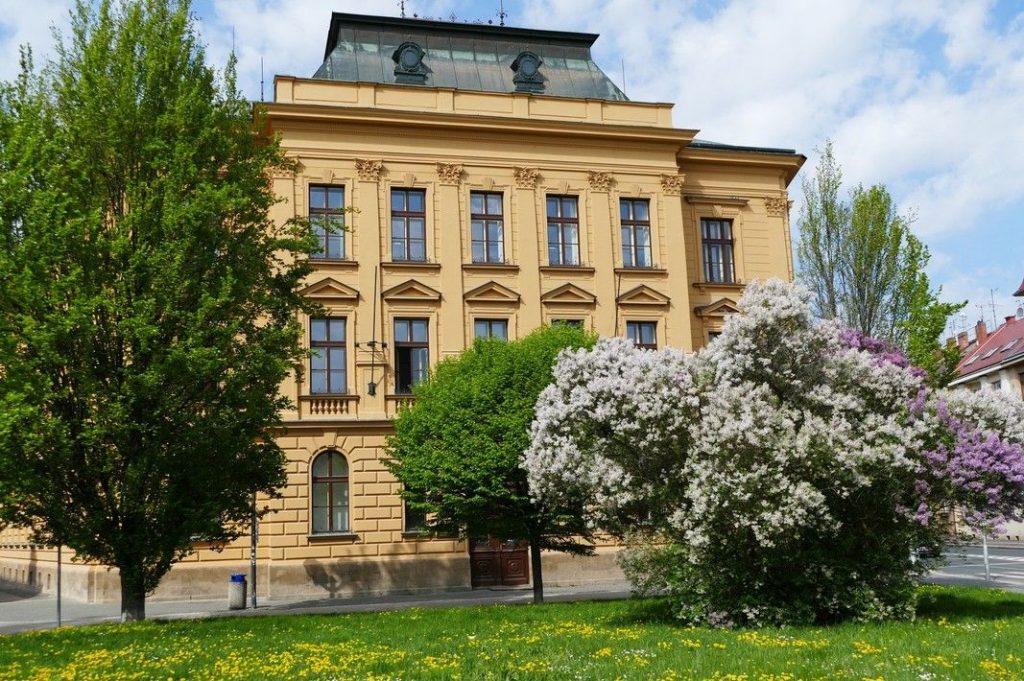
The head of the project and the conference was professor Jaroslav Daneš, with some help from Tomasz Mróz (University of Zielona Góra), a researcher in the project. Participants of the conference focused on historical developments of the classics, including their own experiences, “personal paths”, on recent problems, e.g. with teaching classics, and on the perspectives of future research in this area of studies.
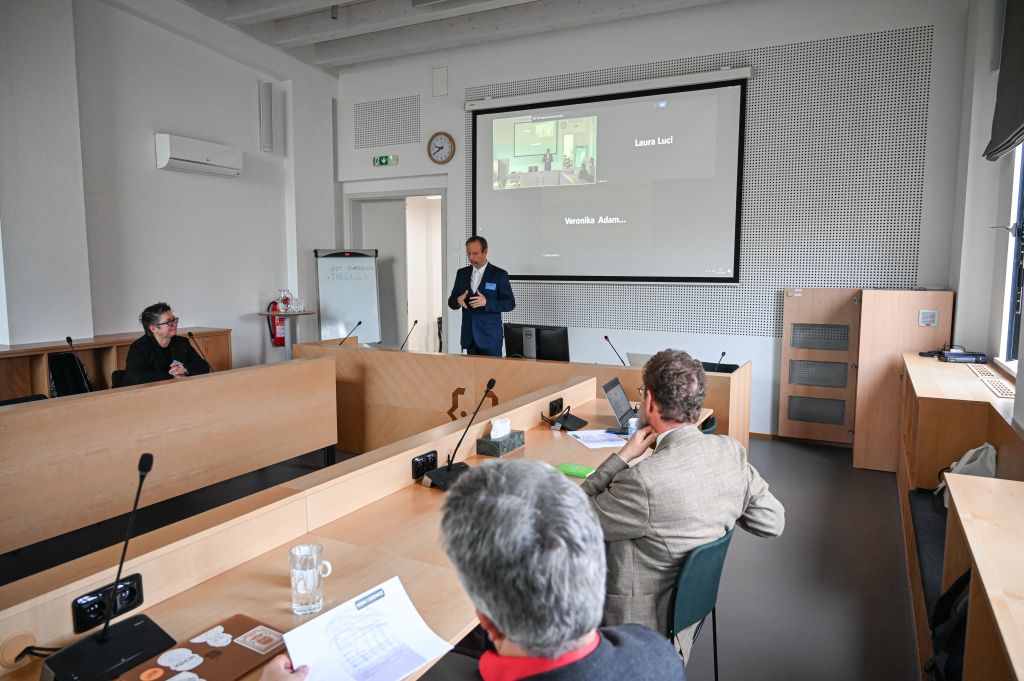
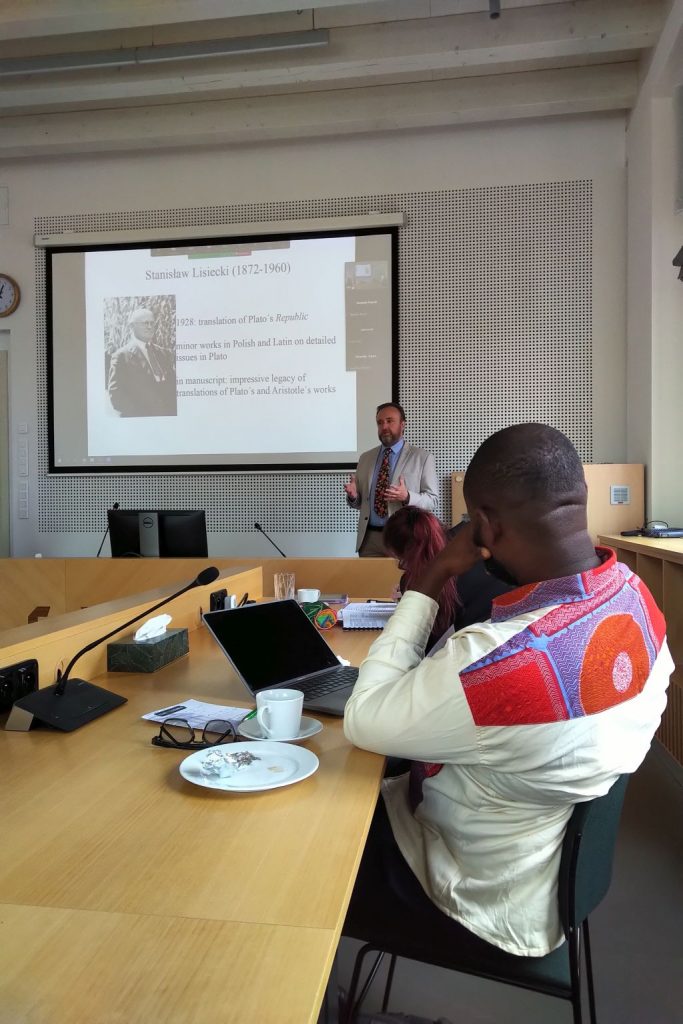
Platonic Inspirations was the title of the session during which an AΦR member,T. Mróz, delivered his paper: Plato in post-war Poland. Continuities and novelty. His talk was devoted to three Polish Plato scholars, who survived the World War II and attempted to include their experience of war and the post-war political situation of Poland into their studies on ancient philosophy. They were, starting with the oldest: Wincenty Lutosławski (1863-1954), Stanisław Lisiecki (1872-1960), Władysław Witwicki (1878-1948). It is sufficient to mention that it was the Marxist interpretation of Plato that was pushed in Poland after the war by Polish Marxist philosophers (e.g. by T. Kroński) and in general works on philosophy translated from Russian. In these circumstances Lutosławski planned to published a volume on Plato presenting him as an intellectual and moral remedy for Europe, Witwicki, quite the opposite, blamed the philosopher for inventing totalitarianism, and Lisiecki turned from Plato to Aristotle, who was more acceptable then as a naturalist and a critic of Plato.
Plato in Poland book available in OA
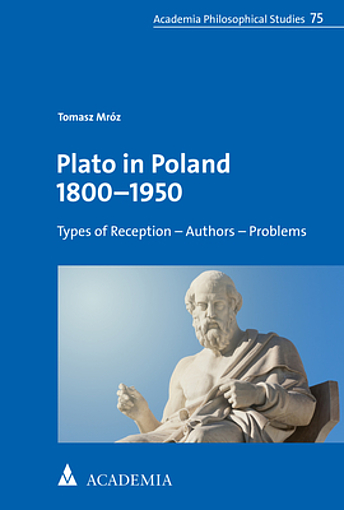
This post is only to announce that the book by T. Mróz, Plato in Poland 1800-1950. Types of Reception – Authors – Problems (Academia Verlag/Nomos Verlagsgesellschaft, Baden Baden 2021), as a result of the agreement with the publisher, is now available free in open access on the Nomos Verlag website here and in the repository of the University of Zielona Góra, here. Enjoy!
(Another) Erasmus Teaching Visit in Vilnius
In April, 15th-19th, 2024, Tomasz Mróz enjoyed his fourth Erasmus teaching visit in Faculty of Philosophy, Vilnius University.
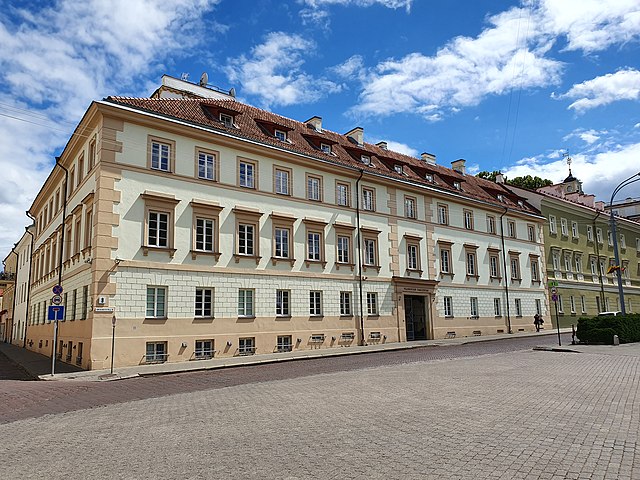
This year, some issues connected to the reception of ancient philosophy were addressed during the lecture on Władysław Tatarkiewicz (1886-1980) and his History of Philosophy. It was ancient philosophy as a subject of various problems in historiography of philosophy.
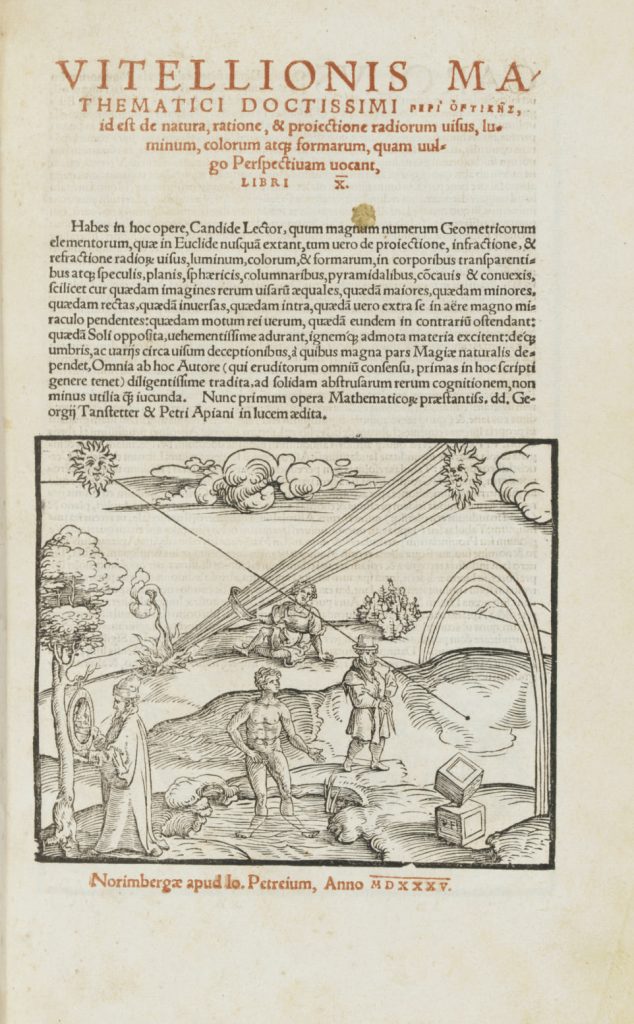
More important, however, was a talk devoted to Vitello (ca. 1230-1300) and his theoretical reflection on the nature of the daemons. Vitello’s demonology stemmed from his research in natural sciences and it employed neo-Platonic and Aristotelian elements, such as a belief in a mathematical structure of the universe, the theory of four elements and natural creatures. Vitello’s philosophical investigations were presented against the background of the 13th century developments in philosophy, especially the Averroist controversy.
Teaching duties were supplemented with meetings with the Faculty members and discussions with students extra universitatis muros. Hopefully, this was not the final chord in the co-operation between Vilnius University and the University of Zielona Góra.
A Visitor from Vilnius and Plato as a Teaching Subject
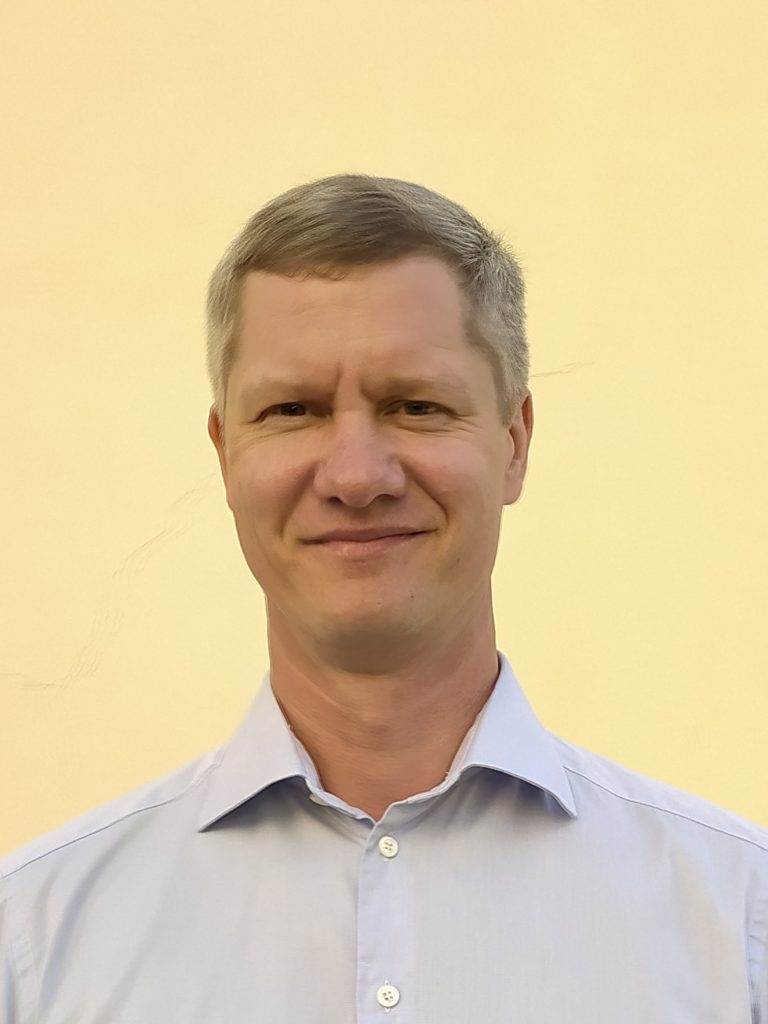
In March 4th-8th an Erasmus exchange visitor from Vilnius University stayed at the University of Zielona Góra and delivered some talks here. Our guest was dr. Mindaugas Stoškus who is an assistant professor at the Department of Theoretical Philosophy and Philosophy of Science, Faculty of Philosophy, VU.
Among M. Stoškus’ presentations there was one on the methods of teaching ancient philosophy, as a part the reception of ancient philosophy, and it was delivered to the students in the Doctoral School of Humanities and Social Sciences and to invited guests. The central topic of his lecture was Plato’s Republic and Plato’s political project which, resulting from Stoškus’ interactive co-operation with the audience, turned out to be a tricky and problematic issue. The lecturer demonstrated to the audience, consisting mostly of non-philosophers, how superficial reading of Plato’s opus magnum may lead to misunderstanding of the true nature of his political aims, one of which was disjoining wealth and personal success from political power and responsibility.
We hope that M. Stoškus’ visit at UZ is not the final chord of the co-operation between our two partner institutions and that our mutual collaboration will develop.
A paper on Polish translations of Plato
The latest issue of the “Revue de philosophie ancienne” (2023/2, vol. XLI) includes a paper by T. Mróz: Polish Translations of Plato’s Dialogues from the Beginnings to the Mid-Twentieth Century.
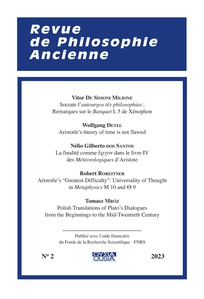
In his paper T. Mróz focuses on four most significant translators of Plato’s dialogues in Poland. They were: Felicjan Antoni Kozłowski (1805-1870), who was the first translator of Plato into Polish; Antoni Bronikowski (1817-1884), who was the most productive in the 19th century and kept on working on Plato in spite of unfavourable reviews; Stanisław Lisiecki (1872-1960), whose numerous translations remained unpublished; and finally Władysław Witwicki (1878-1948), whose renderings of the dialogues are still widely read. The paper presents their achievements and discusses the reception of their works.
Anyone whishing to receive an offprint should feel free to request it from the author via email.
“Small Grant” from the University of Zielona Góra
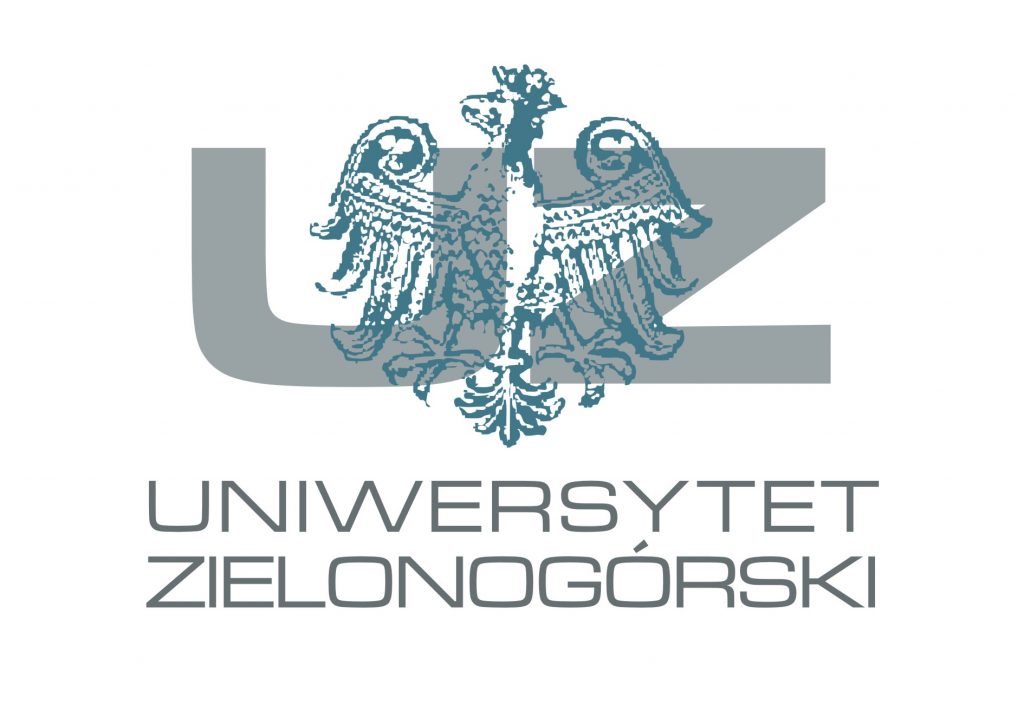
Prof. Marcin Mrugalski, the Deputy Rector for Science and International Cooperationof of the University of Zielona Góra (UZ), home institution of the AΦR, awarded Tomasz Mróz with a “Small Grant” of a maximum possible value. These internal grants are distributed by the Rector annually among those researchers of UZ, who had submitted their proposals to the National Science Centre (NCN), received positive assessements from the experts, yet finally had not been granted funding. Aim of the “Small Grants” is to increase the chances of the researches in future granting competitions.
“Small Grant” funds for AΦR will be spent on developing and strenghtening a co-operation between AΦR members and the Institute of Philosophy (UZ) with colleagues from the Faculty of Philosophy, Vilnius University (VU), on the topic of the history of research on ancient philosophy in VU during its complex history.

Bertrand Russell, His Views on Ancient Philosophy and Critical Reaction on Them in Poland
In August 17-18th T. Mróz took part in the sixth annual History of Analytic Philosophy Workshop organised by Tilburg Center for Moral Philosophy, Epistemology and
Philosophy of Science. This year’s meeting was devoted to Global Reception of Russell’s Scientific Philosophy.

T. Mróz’s paper was prepared in co-operation with Paweł Polak (The Pontifical University of John Paul II in Kraków), who presented his part in an on-line form. The title of their presentation was The Early Reception of Russell’s Philosophy among Polish Philosophers – a Diversity of Perspectives. P. Polak focused in particular on reception of Russell’s ideas among the representatives of the Lvov-Warsaw School, while T. Mróz discussed two cases of reception of Russell’s History of Western Philosophy (1945) among Polish historians of philosophy, and some other issues, e.g. the censorship of Russell’s texts in Poland.
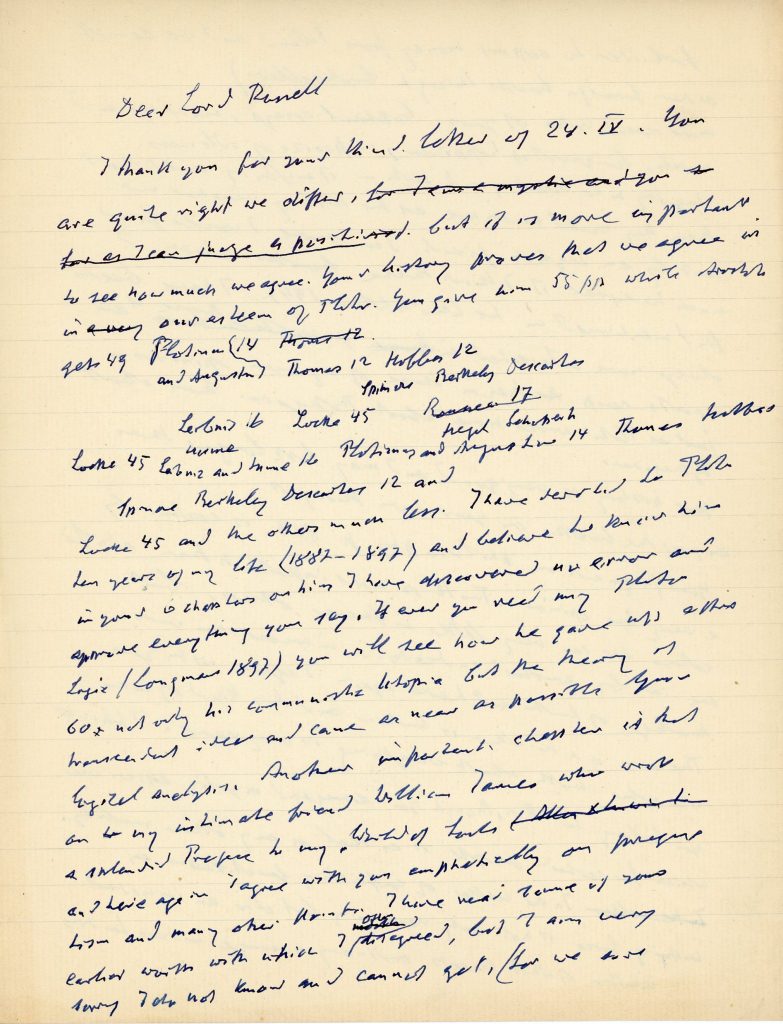
What matters here is ancient philosophy. The first Polish critic of Russell’s History was Wincenty Lutosławski (1863-1954), who expressed his views on Russell’s Plato in a letter (Lutosławski’s draft on the left) to the author (a paper in “Russell” on the letters between the two philosophers has been announced here). Despite the differences between them, Lutosławski declared in his letter: “Your History proves that we agree in our esteem of Plato”. Moreover, he praised Russell, “In your six chapters on him [=Plato] I did not discover a single error and I agree with everything you say”. In fact, both authors set themselves different goals in discussing Plato and this resulted in disparate methods in their presentations of Platonism, yet Lutosławski’s opinion was so important for Russell that he passed it immediately to his publisher.
Marian Heitzman (1899-1964) was not a philosopher of a similar recognition to Lutosławski, he was an expert in Renaissance philosophy and in F. Bacon. His views on Russell’s History were published as an extensive review study in the oldest Polish philosophical journal „Philosophical Review” [Przegląd Filozoficzny]. His general opinion on Russell’s book was the following: “it is worth to read the book and it is worth to have it on a bookshelf, but it cannot be recommended as a handbook or a synthetic study of the history of philosophy”. He appreciated Russell’s style and his „humour coloured by a bit of Volterian scepticism”. His focus was Renaissance philosophy, but he remarked on many deficiences in Russell’s chapters on ancient topics. For example, the missing or too shortly discussed subjects, according to Heitzman, included Gorgias, Zeno and the logic of the Stoics. Although Russell intended to emphasise issues in political and social philosophies, in Heitzman’s eyes he missed the cosmopolitanism of the Cynics and misrepresented the problem of the Sophists and democracy. Finally, Russell aimed to present various philosophers as the effects of their social conditions, but he failed to illustrate this with Antisthenes of Athens (not an Athenian citizen) and his philosophy of cynicism.
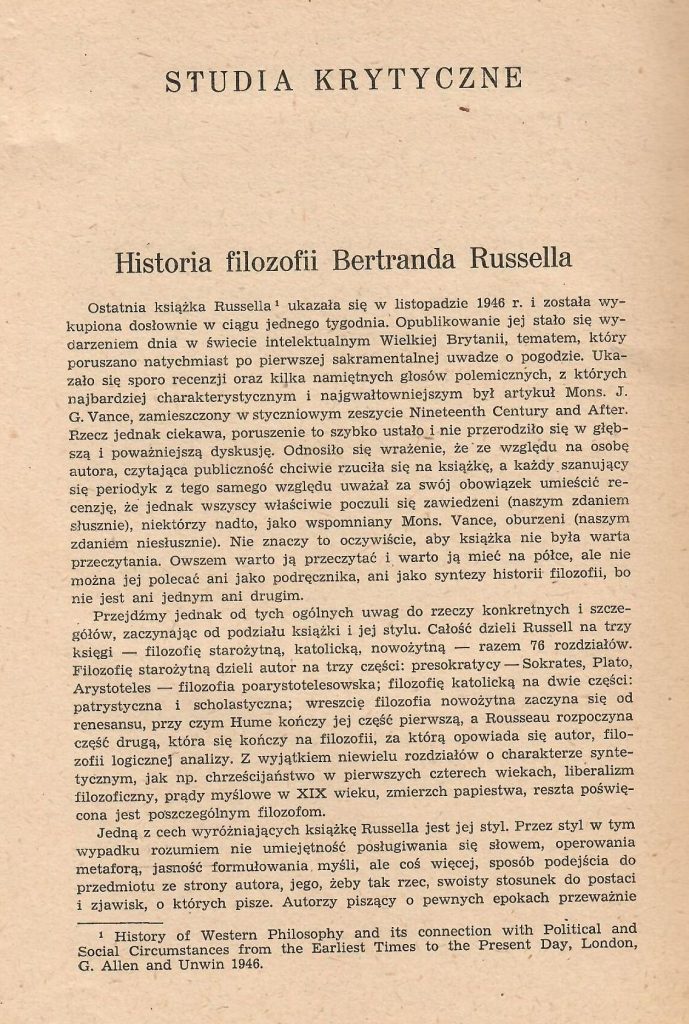
Recent commentaries